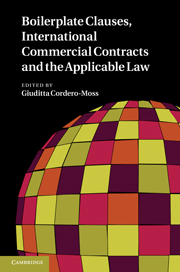Book contents
- Frontmatter
- Contents
- List of contributors
- Preface
- Introduction
- PART 1 How contracts are written in practice
- PART 2 Methodological challenges
- PART 3 The applicable law's effects on boilerplate clauses
- Introduction to Part 3
- 7 The common law tradition: application of boilerplate clauses under English law
- 8 The Germanic tradition: application of boilerplate clauses under German law
- 9 The Romanistic tradition: application of boilerplate clauses under French law
- 10 The Romanistic tradition: application of boilerplate clauses under Italian law
- 11 The Nordic tradition: application of boilerplate clauses under Danish law
- 12 The Nordic tradition: application of boilerplate clauses under Finnish Law
- 13 The Nordic tradition: application of boilerplate clauses under Norwegian law
- 14 The Nordic tradition: application of boilerplate clauses under Swedish law
- 15 The East European tradition: application of boilerplate clauses under Hungarian law
- 16 The East European tradition: application of boilerplate clauses under Russian law
- Conclusion: the self-sufficient contract, uniformly interpreted on the basis of its own terms: an illusion, but not fully useless
- Bibliography
- Index
- References
15 - The East European tradition: application of boilerplate clauses under Hungarian law
from PART 3 - The applicable law's effects on boilerplate clauses
Published online by Cambridge University Press: 11 April 2011
- Frontmatter
- Contents
- List of contributors
- Preface
- Introduction
- PART 1 How contracts are written in practice
- PART 2 Methodological challenges
- PART 3 The applicable law's effects on boilerplate clauses
- Introduction to Part 3
- 7 The common law tradition: application of boilerplate clauses under English law
- 8 The Germanic tradition: application of boilerplate clauses under German law
- 9 The Romanistic tradition: application of boilerplate clauses under French law
- 10 The Romanistic tradition: application of boilerplate clauses under Italian law
- 11 The Nordic tradition: application of boilerplate clauses under Danish law
- 12 The Nordic tradition: application of boilerplate clauses under Finnish Law
- 13 The Nordic tradition: application of boilerplate clauses under Norwegian law
- 14 The Nordic tradition: application of boilerplate clauses under Swedish law
- 15 The East European tradition: application of boilerplate clauses under Hungarian law
- 16 The East European tradition: application of boilerplate clauses under Russian law
- Conclusion: the self-sufficient contract, uniformly interpreted on the basis of its own terms: an illusion, but not fully useless
- Bibliography
- Index
- References
Summary
Introduction
Commercial law does not exist as a separate branch of law in Hungarian private law. Hungarian private law is built on a unified system where the Civil Code covers the regulation of contracts, including the general framework and limits of freedom of contract for merchants as well as for other parties. As commercial contracts are neither defined nor covered by specific legislation, the Civil Code is to be applied to commercial contracts as well. There is specific legislation for contracts of foreign trade providing more liberal regulation compared to the Civil Code, but the applicability of this law decree – still in force as one of the reminders of the socialist legislation – is in question, as in defining its scope it refers to the Foreign Trade Act, which is no longer in force. There is ongoing reform aimed at recodification of Hungarian private law, which would abolish this regulation discrepancy. The New Hungarian Civil Code – expected to come into force in about 2013 – would provide unitary (monistic) legislation and would cover commercial transactions as well.
As a main rule, the provisions of the Civil Code concerning the rights and obligations of the parties are default rules which become the content of the contract insofar as the parties did not agree otherwise. The paradigm of Hungarian contract law is freedom of contract, which necessarily implies that contract law rules are not mandatory.
- Type
- Chapter
- Information
- Publisher: Cambridge University PressPrint publication year: 2011



